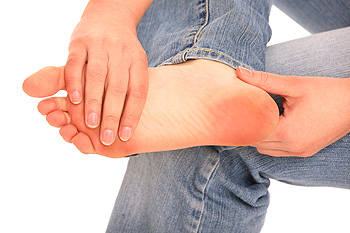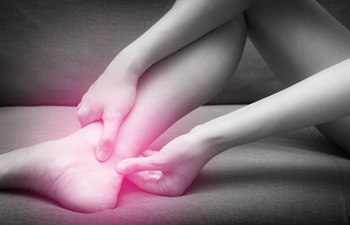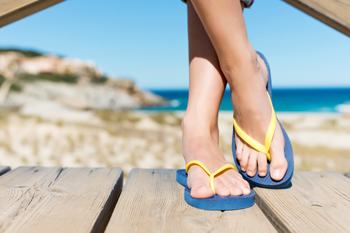 The nerve that becomes thick or irritated in patients that have Morton’s neuroma is referred to as the plantar interdigital nerve. This condition can produce severe pain and discomfort, and generally occurs between the second, third, or fourth toes. It can develop as a result of wearing shoes that do not have adequate room for the toes to move freely in, or from repetitive impact that can come from participating in running and jumping activities. Common symptoms that many patients experience can include a burning pain in the forefoot, and many people often describe the feeling as having a small stone that is lodged under the foot. If you are afflicted with Morton’s neuroma, please confer with a podiatrist as quickly as possible who can effectively treat this condition.
The nerve that becomes thick or irritated in patients that have Morton’s neuroma is referred to as the plantar interdigital nerve. This condition can produce severe pain and discomfort, and generally occurs between the second, third, or fourth toes. It can develop as a result of wearing shoes that do not have adequate room for the toes to move freely in, or from repetitive impact that can come from participating in running and jumping activities. Common symptoms that many patients experience can include a burning pain in the forefoot, and many people often describe the feeling as having a small stone that is lodged under the foot. If you are afflicted with Morton’s neuroma, please confer with a podiatrist as quickly as possible who can effectively treat this condition.
Morton’s neuroma is a very uncomfortable condition to live with. If you think you have Morton’s neuroma, contact Dr. Lubrina Bryant of District Podiatry, PLLC. Our doctor will attend to all of your foot care needs and answer any of your related questions.
Morton’s Neuroma
Morton's neuroma is a painful foot condition that commonly affects the areas between the second and third or third and fourth toe, although other areas of the foot are also susceptible. Morton’s neuroma is caused by an inflamed nerve in the foot that is being squeezed and aggravated by surrounding bones.
What Increases the Chances of Having Morton’s Neuroma?
Morton’s neuroma is a very treatable condition. Orthotics and shoe inserts can often be used to alleviate the pain on the forefront of the feet. In more severe cases, corticosteroids can also be prescribed. In order to figure out the best treatment for your neuroma, it’s recommended to seek the care of a podiatrist who can diagnose your condition and provide different treatment options.
If you have any questions, please feel free to contact our office located in Washington, D.C . We offer the newest diagnostic and treatment technologies for all your foot care needs.
 Swollen feet is a common symptom that many women experience during pregnancy. This can be a result of increased hormone levels as well as increased levels of fluids in the body. Additionally, the blood becomes thicker in pregnant women and the blood volume is said to increase up to 50%. Swollen feet can typically be noticed during the second trimester, but really amps up in the third trimester as the body continues to raise blood and fluid levels to prepare for the baby's arrival. Relief may be found when caffeine intake is limited and the feet are frequently elevated. It can help to drink plenty of fresh water daily as well. Research has also indicated that swelling may be reduced when less sodium is ingested, and it may be beneficial to eat foods that have adequate levels of potassium. If you would like more information about how pregnancy affects the feet and different ways to alleviate the swelling, please confer with a podiatrist.
Swollen feet is a common symptom that many women experience during pregnancy. This can be a result of increased hormone levels as well as increased levels of fluids in the body. Additionally, the blood becomes thicker in pregnant women and the blood volume is said to increase up to 50%. Swollen feet can typically be noticed during the second trimester, but really amps up in the third trimester as the body continues to raise blood and fluid levels to prepare for the baby's arrival. Relief may be found when caffeine intake is limited and the feet are frequently elevated. It can help to drink plenty of fresh water daily as well. Research has also indicated that swelling may be reduced when less sodium is ingested, and it may be beneficial to eat foods that have adequate levels of potassium. If you would like more information about how pregnancy affects the feet and different ways to alleviate the swelling, please confer with a podiatrist.
Pregnant women with swollen feet can be treated with a variety of different methods that are readily available. For more information about other cures for swollen feet during pregnancy, consult with Dr. Lubrina Bryant from District Podiatry, PLLC. Our doctor will attend to all of your foot and ankle needs.
What Foot Problems Can Arise During Pregnancy?
One problem that can occur is overpronation, which occurs when the arch of the foot flattens and tends to roll inward. This can cause pain and discomfort in your heels while you’re walking or even just standing up, trying to support your baby.
Another problem is edema, or swelling in the extremities. This often affects the feet during pregnancy but tends to occur in the later stages.
How Can I Keep My Feet Healthy During Pregnancy?
If you have any questions please feel free to contact our office located in Washington, D.C . We offer the newest diagnostic and treatment technologies for all your foot and ankle needs.
 The Achilles tendon is the band of tissue that connects the back of the calf muscle to the heel bone. Achilles tendinopathy occurs when the Achilles tendon is stressed and experiences very small tears or other damage. “Tendinitis” refers to fresh damage, usually within 10 days, and once the inflammation has gone away and only the tears remain, “tendinopathy” occurs. Those suffering from Achilles tendinopathy typically have severe pain and weakening around the ankle. Symptoms usually worsen during physical activity, but relief may be found with heat or ice packs. Those who are experiencing Achilles tendinopathy should consult with a podiatrist. Pain management is the first step, and orthotics, ankle braces or walking boots may also be necessary.
The Achilles tendon is the band of tissue that connects the back of the calf muscle to the heel bone. Achilles tendinopathy occurs when the Achilles tendon is stressed and experiences very small tears or other damage. “Tendinitis” refers to fresh damage, usually within 10 days, and once the inflammation has gone away and only the tears remain, “tendinopathy” occurs. Those suffering from Achilles tendinopathy typically have severe pain and weakening around the ankle. Symptoms usually worsen during physical activity, but relief may be found with heat or ice packs. Those who are experiencing Achilles tendinopathy should consult with a podiatrist. Pain management is the first step, and orthotics, ankle braces or walking boots may also be necessary.
Achilles tendon injuries need immediate attention to avoid future complications. If you have any concerns, contact Dr. Lubrina Bryant of District Podiatry, PLLC. Our doctor can provide the care you need to keep you pain-free and on your feet.
What Is the Achilles Tendon?
The Achilles tendon is a tendon that connects the lower leg muscles and calf to the heel of the foot. It is the strongest tendon in the human body and is essential for making movement possible. Because this tendon is such an integral part of the body, any injuries to it can create immense difficulties and should immediately be presented to a doctor.
What Are the Symptoms of an Achilles Tendon Injury?
There are various types of injuries that can affect the Achilles tendon. The two most common injuries are Achilles tendinitis and ruptures of the tendon.
Achilles Tendinitis Symptoms
Rupture Symptoms
Treatment and Prevention
Achilles tendon injuries are diagnosed by a thorough physical evaluation, which can include an MRI. Treatment involves rest, physical therapy, and in some cases, surgery. However, various preventative measures can be taken to avoid these injuries, such as:
If you have any questions please feel free to contact our office located in Washington, D.C . We offer the newest diagnostic tools and technology to treat your foot and ankle needs.
 Flip-flops are popular summer footwear for their ease and comfort, but did you know that wearing flip-flops can be detrimental to your foot health? Because of their generally flimsy structure and lack of cushioning, wearing flip-flops can lead to a variety of foot problems. Plantar fasciitis, the inflammation of the tissue that runs along the bottom of the foot, can be caused by wearing flip-flops as they do not provide arch support. Tendinitis, inflammation or irritation of the tendons located on either side of your ankles, is another common condition that can be caused by flip-flops. Flip-flops create instability in your ankles when you walk, which makes an injury more likely. Metatarsalgia, pain in the bottom of the foot, can also be caused by wearing flip-flops, as these completely flat shoes do not cushion your feet from the pounding and pressure exerted on your joints as you walk. If you are experiencing foot problems, it is recommended that you seek the care of a podiatrist.
Flip-flops are popular summer footwear for their ease and comfort, but did you know that wearing flip-flops can be detrimental to your foot health? Because of their generally flimsy structure and lack of cushioning, wearing flip-flops can lead to a variety of foot problems. Plantar fasciitis, the inflammation of the tissue that runs along the bottom of the foot, can be caused by wearing flip-flops as they do not provide arch support. Tendinitis, inflammation or irritation of the tendons located on either side of your ankles, is another common condition that can be caused by flip-flops. Flip-flops create instability in your ankles when you walk, which makes an injury more likely. Metatarsalgia, pain in the bottom of the foot, can also be caused by wearing flip-flops, as these completely flat shoes do not cushion your feet from the pounding and pressure exerted on your joints as you walk. If you are experiencing foot problems, it is recommended that you seek the care of a podiatrist.
Flip-flops are not always the best choice of footwear. If you have any concerns about your feet or ankles, contact Dr. Lubrina Bryant from District Podiatry, PLLC. Our doctor will assist you with all of your foot and ankle needs.
Flip-Flops and Feet
When the weather starts warming up, people enjoy wearing flip-flops. Flip-flops are comfortable, stylish, and easy to slip on and off; they're perfect for any summer beach goer. However, these shoes can cause harm to the feet.
How Can Flip-Flops Affect Me Long-Term?
Are There Injuries Associated with Flip-Flops?
Yes. Since flip-flops are relatively weak and do not provide the same amount of support as sneakers, people who wear flip-flops regularly are more susceptible to injuries. On top of that, the open nature of the shoe makes your feet more prone to other problems, such as cuts and even infections. Common injuries and ailments include:
I like Wearing Flip-Flops. Are There Safe Alternatives?
When buying flip-flops, try to find ones that have sturdy soles and that are made of high-quality materials that will support for your feet. These flip-flops will cost more but will also last longer as a result.
If you have any questions please feel free to contact our office located in Washington, D.C . We offer the newest diagnostic and treatment technologies for all your foot and ankle needs.